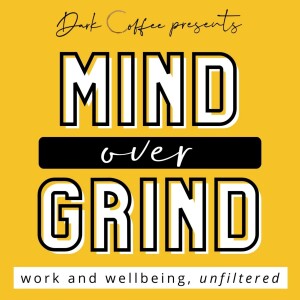
Mind Over Grind from Dark Coffee
Business

An interview episode around disability, empowerment, accessibility, self-acceptance and connection.
This week, host Alice Lyons interviews Rachael Mole, talking about a range of subjects relating to disability and mental health, such as the lack of accessibility in society, difficulties in diagnosis, the importance of down-time and asking questions and resources available to those feeling isolated.
A champion for mental health and disability narratives, Rachael Mole is the Editor in Chief of the City Girl Network, a global social network helping women in their 20s and 30s call their cities ‘home’. As Editor of the City Girl Magazine, an online platform that combines content from all cities to create a one-stop base for finding out everything you need to know about each city.
You can find out more about Rachael and the City Girl Network below:
City Girl Network: https://citygirlnetwork.com/
City Girl Network magazine: https://citygirlnetwork.com/magazine-1
Rachael’s LinkedIn: https://www.linkedin.com/in/rachael-mole-05b193155/
The Tired Girl Society: https://thetiredgirlsociety.com/
(1:27) Introductions
(2:54) Rachael’s personal experience with diagnosis, including how her mothers past experience as a nurse affected the decision to continue pushing for a diagnosis
(7:30) The commonality of Ehlers Danlos syndrome (it’s the most common undiagnosed condition)
(8:50) The link between mental health and a chronic condition & how it’s a cycle
(10:10) Self-awareness, the coping mechanism of having a couple of days to slow down (a bodily reaction) ft. appearance from Bryn the Collie!
(11:09) Self-acceptance of living life around a disability rather than trying to live as somebody who isn’t disabled
(12:30) The struggle of identity and the issue around a ‘non-visible’ disability and the need to either prove that you are or aren’t, including using a blue badge when there isn’t a visible disability
(15:20) Connotations of the word ‘disabled’ and the difficulty of owning the word ‘disabled’ or attempting to adapt it to suit a more knowledgeable society
(16:45) How society isn’t engineered for disabilities, particularly Rachael’s personal experiences growing up with a disability and how other people viewed it
(20:00) The struggle of internalising the pain and the difficulty of putting words to it
(22:15) Having role models to aspire to, leading to a change in mentality inspired by female family members
(25:45) Viewing the past as traumatic and acknowledging it was traumatic, continually being told that your condition isn’t valid or real, the realisation of this coming with the offer of psychological therapy
(27:47) The lack of accessibility for disabled people, even though arguably making businesses more accessible is more profitable. Things such as having braille or large print menus, for example, should be a regular accommodation
(35:01) The City Girl Network, getting information out there in an accessible way
(36:20) Self-advocacy, how knowledge is empowering and having that knowledge can allow you to make informed decisions for your own health
(42:40) The benefits of Open University and the accessibility it gives those who may feel isolated
(46:13) How disabled people constantly have to justify why they need certain things, the role that a society lacking in accessibility plays in the perception of disabilities
(48:55) Another Bryn appearance, the process of getting employed as a disabled person and how having good intentions behind your questions can help everyone
(55:10) The good that can come from being online, The Tired Girl Society, The City Girl Network and how social media helps those who feel isolated not feel alone
(56:35) Closing comments
Welcome to Dark Coffee, the podcast that starts engaging and approachable conversations around mental health.
Join wellbeing advocate, Alice Lyons, as she attempts to normalise the conversation around mental health, from suicide to satisfaction and everything in between.
Da
view more
More Episodes
Ep.96 - My experiences with suicidality
 2022-09-29
2022-09-29
 2022-09-29
2022-09-29
Ep.94 - Ten hacks for team wellbeing
 2022-06-08
2022-06-08
 2022-06-08
2022-06-08
Ep.89 - How to stop being a dick to yourself
 2022-01-05
2022-01-05
 2022-01-05
2022-01-05
Ep.87 - What to do when work sucks
 2021-12-10
2021-12-10
 2021-12-10
2021-12-10
Ep.84 - How to clear out a cluttered mind
 2021-09-16
2021-09-16
 2021-09-16
2021-09-16
012345678910111213141516171819
Create your
podcast in
minutes
- Full-featured podcast site
- Unlimited storage and bandwidth
- Comprehensive podcast stats
- Distribute to Apple Podcasts, Spotify, and more
- Make money with your podcast
It is Free
- Privacy Policy
- Cookie Policy
- Terms of Use
- Consent Preferences
- Copyright © 2015-2024 Podbean.com





